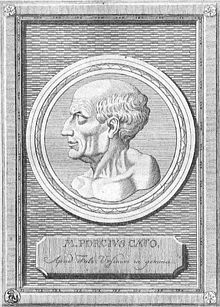Lucius Veturius (Eques)
Lucius Veturius was a Roman knight ( Eques ) from the gens of the Veturians , who lived in the 2nd century BC. Lived. He was perhaps a grandson of Lucius Veturius Philo , who lived in 220 BC. Had exercised the consulate .
In 184 BC Chr. Cato accused him of neglecting religious acts of sacrifice on the occasion of the recurring rider inspection ( equitum census or recognitio equitum ) . In addition, the knight was accused of being unfit for active riding service in the Roman army due to his corpulence.
The physical constitution of a knight could in principle trigger the objection of the censors . If the person concerned appeared too stout or otherwise handicapped in order to be useful as a rider, this could mean a farewell from military service and the associated withdrawal of the state riding horse. There were no further disadvantages for the person concerned, as the physical inability through no fault of their own was not viewed as dishonorable behavior and therefore did not result in a censorical reprimand ( nota censoria ) with a list note ( nota ).
In the case of Lucius Veturius, criticized by Cato, who, however, accused him of his feebleness due to his unrestrained and thus dishonorable way of life, a reprimand can be assumed.
Apart from the reclamation of the riding horse ( adimere equum ), which was pronounced by the censoring phrase "Vende equum", no further consequences were handed down in the incompletely preserved explanatory speech by Cato.
literature
- Rudolf Hanslik : Veturius I.2. In: The Little Pauly (KlP). Volume 5, Stuttgart 1975, Col. 1240.
- Dieter Medicus : Nota censoria. In: The Little Pauly (KlP). Volume 4, Stuttgart 1972, Col. 164 f.
Remarks
- ^ Aulus Gellius , Noctes Atticae , 7, 22 (English translation)
- ↑ Cato , Orationes , Frg. 72-82 (online)
| personal data | |
|---|---|
| SURNAME | Veturius, Lucius |
| BRIEF DESCRIPTION | roman knight |
| DATE OF BIRTH | 3rd century BC Chr. |
| DATE OF DEATH | 2nd century BC Chr. |
